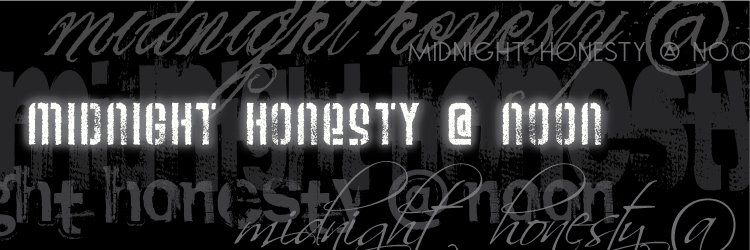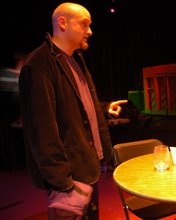True and False
Lest I for some reason forget to mention it later in this entry:
David Mamet is a self-impressed windbag.
This is a book that would feel better, less martyred, and truer if delivered by Don Hall over beer. Shorter too. (The expurgated Don Hall version; “Say the fucking words and mean it…”) I’m sure I am the last person in America to read this book so I will gloss the contents to get to my problems with it.
Mamet spends the first half of this short book mocking everything any actor has ever attempted to use to create a system for themselves. Systems are signs of fear in an actor according to Mamet.
Of course his hard target is Stanislavski, but his deconstruction of the Method is more slipshod than the average blog post, leading me to really hate the first half of the book. The easy criticism of the book is that it’s a writer telling performers to shut up and do the words, and stop trying to do anything BUT say the words. His choice to lob grenades instead of really digging in and taking the Method apart piece by piece reinforces that perception. It’s one thing to feel that a system has invalid points, or to even feel that having a system is the wrong choice, but the mocking tone really grates.
The secondary target of the first half of the book is acting training in general and academia in general. So it’s a good thing that he is in no way affiliated with any sort of acting training program, that would be awkward…
The idea is that: due to the given invalidity of having any sort of process or system by which you approach a script or a role the concept of paying someone to teach is rank stupidty. Further it is real world avoidance. If you weren’t afraid of having a career in theatre, or of performing at all, you would simply head out into the real world and Do it.
Mamet’s conjecture throughout the first half of the book is that actor’s think too much, that acting is a 100% non-intellectual pursuit, and that actor’s need to get over themselves and do it. He seeks to strip anything academic, intellectual or mystical away from the craft of performance, asking how the musician or busker would approach performance.
Thankfully the first half of the book ends and he actually shares some thoughts on How Things Should Be.
Which of course means that he puts back all the parts of Process that he thinks are valuable and gives them slightly different names.
- Mamet is wrong about a need for a system. And he knows it, which is why he suggests system in the second half of the book without calling it that.
He suggests simply ‘breaking it down into smaller pieces’ and attack a script. But in a shortened rehearsal process in an itinerant work place you need a shared vocabulary. Mamet feels that you only need two weeks rehearsal. With a rep company who already shares a process and a vocabulary? Sure. If you eliminate both It’s simply not feasible.
His frustration comes from the misguided application of any acting theory to performance itself. Actors coming from an academic background are taught to act via a method (Hagen, Meisner, Stanislavski et al) and they then take that method on stage with them. I’ve yet to run into the young actor who has been taught that they are rehearsal techniques and that by curtain they should be removed from performance much like concrete forms.
This is not Algebra II, do not show all work.
(This goes double for Viewpoints) - I love his admonition to actors to simply perform each scene properly and let the writer (and I would add: director) worry about the arc of the character and the play. If actors approached every scene as an entity to itself we could eliminate the phrase '”playing the end” from the theatrical lexicon, and we’d be happier for it.
- Mamet desires for actors to play the scene with interesting actions, but never really answers how expects them to choose that action. The answer of course is that they (or the team) does a little dramaturgical digging and they come up with the best action (NOT intention – systems are for wimps) for the character.
But by all means active interesting intention choices for all. - Mamet talks a lot about actors doing Funny Voices without ever simply defining Funny Voices. So far as I can tell he means the heightened language trap that many actors fall into even in Realism, but as he didn’t define it I’m going to extrapolate his Say The Words As Written Loudly And Clearly through the No Funny Voices point to agree with me that the War on Idioms must be stopped.
English is an idiomatic language. You speak in idioms every day. Feel free to stop trying to turn the idioms in your script into Shakespeare. (+1 for Mr. Mamet’s anti-intellectualism screed) - Mamet in his quest to strip away a century of bullshit from the art of (especially American) acting attacks the mysticism as a pretension of the actors club. He asks why musicians and buskers don’t feel the need to Be Someone Else when they perform, and suggests that it is fear that drives actors to claim some sort of artistic shamanism.
And then misuses a common legend a half dozen times. After trying to demystify the art, he exhorts actors to return to a time when actors were buried at a crossroads with a stake in their heart." A desire for actors to return to the boldness they once had.
Of course the actors were buried like other mystical creatures (werewolves and vampires among others) because it was believed that they actually incarnated their characters, meaning that their souls were loosed from their bodies. The stake was to keep that loose soul from wandering about the moors.
There is too much dependence by actors on this belief that they will Become Other, but the concept itself isn’t the destructive force that Mamet presents it as. - He spends an awful lot of time telling actors to stop telling others after a show that they were “off tonight.” I get the sentiment. I am as guilty of it as anyone, and it’s passive aggressive and annoying to the participant. But much like talking to an athlete immediately after the game you’re going to get one of two things:
A.) You get them in the process of them breaking down their performance.
B.) You get the Bull Durham nothing of consequence litany.
Lesson?
Audience members: Don’t ask if you don’t mean it.
Actors: Don’t answer “Nice Job!” with “No it wasn’t”. - Mamet seems unconcerned with repeatability. In the first half of the book he keeps going back to the idea of simply reacting to what you’re given every night rather than trying to adhere to a game plan, because one is honest and the other is artifice.
That doesn’t work for me. The audience paid to see a show, not to see me figure out what I’m doing every night. If you can’t have honesty in your scenes repeatably, you’re not good. That doesn’t mean we toss out the idea of doing the show as intended every night.
This whole piece doesn’t seem to jibe with his say the words right policy, but I could be misreading it.
Is there too much bullshit attached to the acting process? Sure.
Is there too much dependence on third-hand recollections of acting theory? Yes.
Are there too many charlatan acting teachers? Yes.
But that doesn’t mean we throw out the entire machinery. It means we scrape the rust off and get back down to the bare metal of what it is we do.
Can True and False help with that? Absolutely. Particularly the second half of the book. But read the whole thing because reexamining how you go about your craft and (frankly) getting all fired up about acting theory is good for you.
HOMEWORK
Have you read True and False?
What worked for you?
What didn’t?
What is YOUR single biggest pet peeve about current acting trends?








